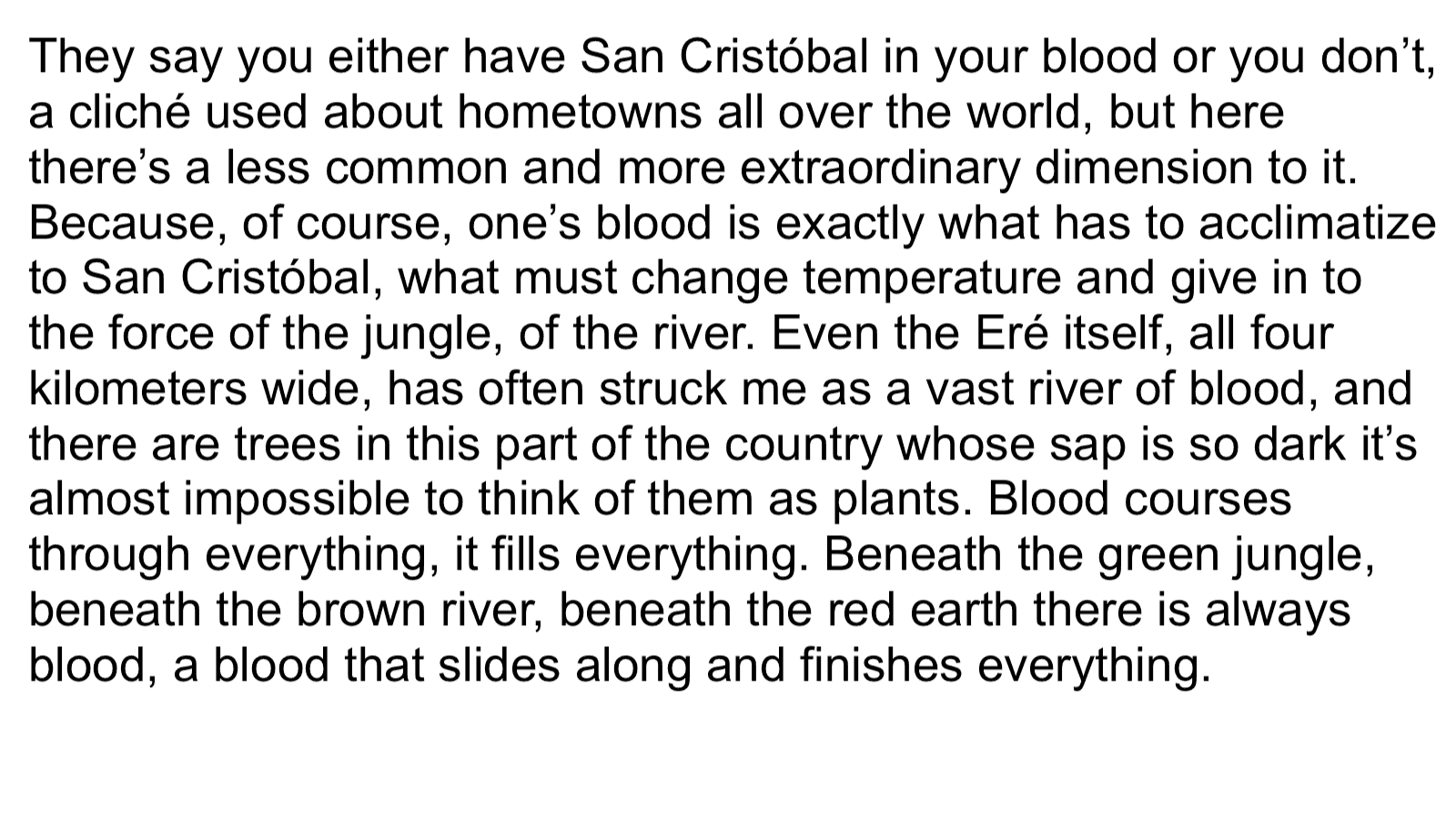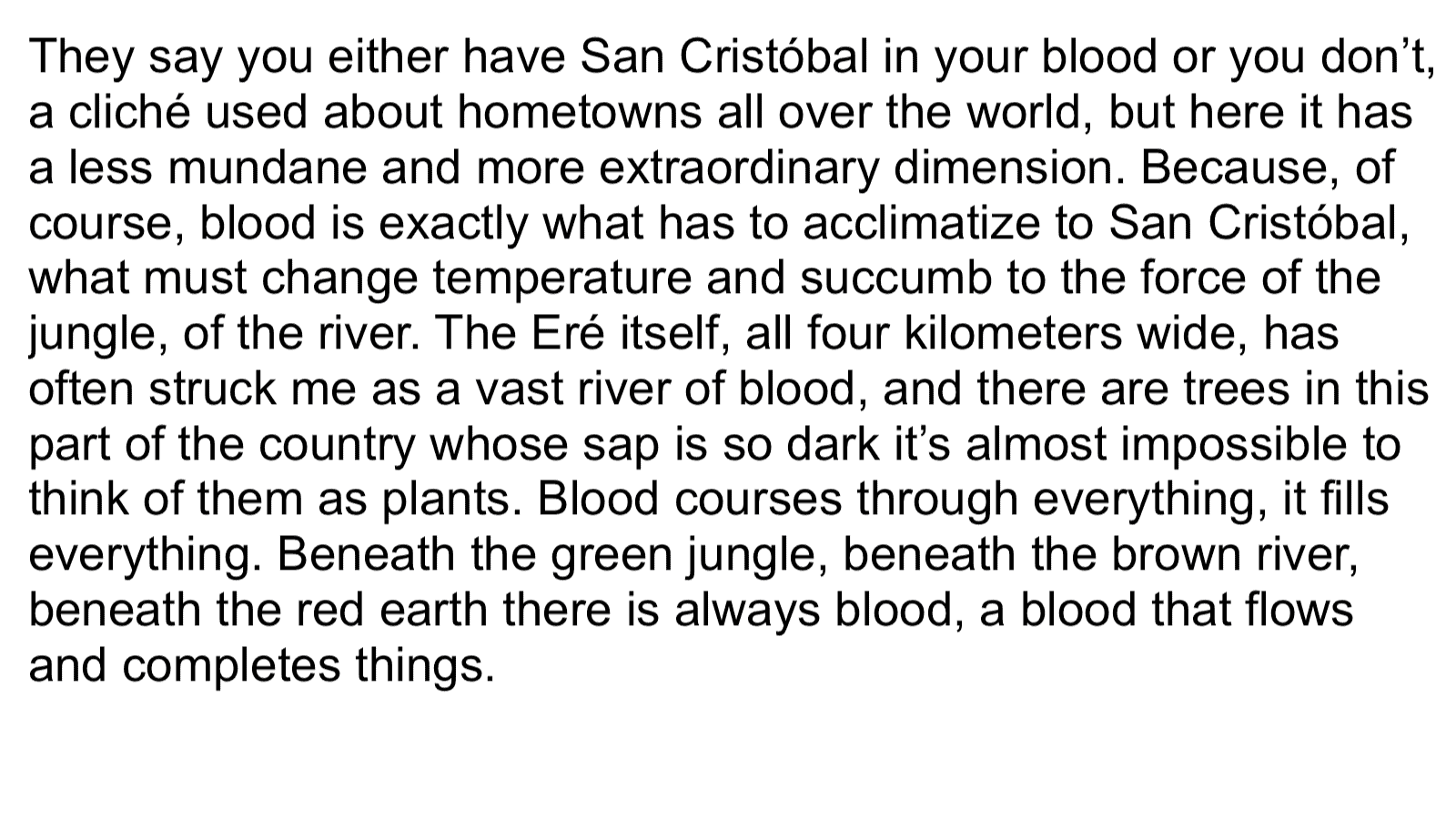

When Lisa Dillman first encountered Spanish writer Andrés Barba’s work, his novels hadn’t yet been translated into English. Working together, the two would go on to translate and publish much of his oeuvre, expanding his readership and winning many awards along the way. Earlier this year, they put out A Luminous Republic, a haunting novel set in a mythical landscape where “blood flows and completes things.”
Before hanging up with Dillman, I told her how honored I was to have talked with her. Barba, I explained, is one of my favorite living writers, and I was grateful to bring this interview to Guernica’s readers. She replied that she’s a big fan of Guernica and that, early in her career, the magazine published some of her stories. “Translations,” she hastened to clarify. “Not my own.”
— Ben Purkert for Guernica
Guernica: You first discovered Andrés Barba’s work in a Madrid bookstore. Is that right?
Lisa Dillman: Yes, it happened by chance. I’d never heard of him before. I picked up one of his books from the new releases table and saw that it was about a developmentally disabled girl who lives with her mother who is a prostitute and her sister who is a striptease dancer. And I looked at the description of Barba, who I think at the time was in his late 20s, and I thought, “Come on, who is this young guy writing a novel about three women with these kinds of challenges?” I bought it rather cynically.
Guernica: Cynically?
Dillman: Well, maybe not cynically, but I definitely didn’t think he could pull it off. Then I read it and was blown away. I got hooked and began to read everything he wrote. At the time, none of his books had been translated into English. I emailed him right away and that’s how our relationship started.
Guernica: How do you know when you find an author you want to translate? Is it the same impulse that draws you in as a reader?
Dillman: I love how Andrés’s novels explore concepts of innocence and purity, and how they engage in deep psychological questioning, often from a child’s perspective. In this latest book, A Luminous Republic, the suspense is what grabbed me. Which is funny, since the first paragraph has all the spoilers. You know from page one that thirty-two kids are going to die. And yet the text has such an ominous quality, it pulls you in.
Guernica: You can feel that ominousness in the paragraph above. There’s blood everywhere.
Dillman: It’s mentioned a lot, isn’t it?
Guernica: Looking at the two versions, I see that you changed out a number of the verbs. For example, “give in” has become “succumb.” It feels like, in the final draft, you’ve ratcheted up the dramatic tension.
Dillman: Yes, I think that’s right. I decided to use “succumb” because it felt more ominous, more inexorable. In this book, I think of the jungle almost as a main character, a powerful and deeply personal force. It’s also interesting, though, because this is exactly the kind of edit I often make in my process as a translator.
Guernica: How so?
Dillman: Most translators start out by doing a very quick, semi-literal translation of a text and then they revise from there. I do the opposite. I will reread what I do, even on a daily basis, several times. Then, in subsequent drafts, I frequently find myself working my way back to something that’s closer to the literal.
Guernica: Why is that?
Dillman: My process has been influenced by Ortega y Gasset, a Spanish philosopher. He has an essay called “The Misery and Splendor of Translation” where he talks about the translator forcing a sourced text into a straitjacket by normalizing certain things. And I’m very conscious of that when I’m translating, because my goal isn’t to make something sound like it was written in English.
By the same token, one of the reasons you want to translate the original text is because, presumably, it’s beautiful; and it conveys something in its own unique, lyrical way. So you’ve got to express that beauty or that lyricism in the translated text. I find it delicate, that negotiation. But it often seems that, in subsequent drafts, with some distance, I decide, “Yeah, I think that can work in English. I think that’s all right.”
Guernica: In another interview you did, you compared translating to acting. Could you elaborate on that?
Dillman: When I translate a book, I have to get into character. I know some translators who are able to simultaneously work on three different novels, and I find that that’s just not my style. I very much feel I need to go one at a time, and I do as much background reading as I can. It’s an arduous process, but it helps me take on the voice of the text. As an example, when I was translating a book by Yuri Herrera about a fire in a mine, I read four books on mining — in part to understand how the business works, but also to become familiar with the lexicon. Because whether you’re talking about a specialized topic like mining or, in the case of A Luminous Republic, a jungle full of children, there’s a certain vocabulary you need to access. It’s not just a matter of picking up a text and forcing it into English. I need to enter the text through a more organic process.
Guernica: Are there certain aspects of Barba’s Spanish that make his work particularly difficult to translate?
Dillman: Well, Spanish in general can be tough to translate, because the language enables certain possibilities that just don’t work syntactically in English. Take, for example, the opening words of the paragraph above. I translated “se dice” as “they say.” But that’s not perfect, because the phrase can also mean “one says” or “you say” or “it is said.” It has shades of all of them, but the English makes you choose.
Another issue has to do with subject pronouns. In Spanish, it’s natural to omit them. If you know who is speaking, who is walking, who is dancing, you just use the verb. But English requires us to include subject pronouns. And this proved a problem with another Andrés Barba novel I translated called Death of a Horse. The main characters include a man, a boy, and a horse – all masculine in Spanish. And for much of the book, no names are used. It’s just the verbs! So it’s virtually impossible to tell who is being referred to. You have all these sentences that, literally, from the Spanish, would be things like: “He/It looked at him/it and he/it looked away, not wanting him/it to realize that he/it was gazing at him/it.” In Spanish, none of those subjects or objects are textually present at all, but English doesn’t have that economy. It can be crazy-making.
Guernica: When the New York Times reviewed A Luminous Republic, they described it as “precisely translated.” (They didn’t particularly love the book, and I think they absolutely got it wrong.) What do you make of a comment like that? Are they in any position to say whether it’s been translated precisely or otherwise?
Dillman: The fact of the matter is that the vast, vast majority of reviewers don’t read the original text, and I’d venture to say that the majority of them also don’t have access to the original. So a word like “precise” is quite interesting, because who knows if that means that they felt that the language itself was precise, or if it was precisely translated. But, to be honest, I always find reviews very stressful because even if a reviewer has access to the original, they still can’t be inside the head of the translator and understand what led them to make a decision in a certain instance. Thankfully, I think reviewing translations has generally gotten better over the past decade or two. It used to be common that you would read reviews in which critics would nitpick about a particular phrase or point out a certain inaccuracy, and it was a sort of “gotcha” style of finding something unjustified or erroneous. There may be a thousand reasons why a translator decides to stray from the literal. It’s really difficult to judge.
Speaking of which, I just finished Drive Your Plow Over the Bones of the Dead by the Polish author, Olga Tokarczuk. Have you read it?
Guernica: Not yet, no.
Dillman: Well, I know this sounds absurd to say, but I found myself thinking as I was reading, this really is an amazing translation; it sounds like Polish. And I don’t speak Polish, so how would I know? But I did feel that the translator, Lloyd-Jones, had done a fantastic job of creating a very unique and quirky voice that was unlike any voice I’d ever heard before. It sounded new to my ear. But often, when critics review translations, they’re not interested in that. They want writing that sounds, to them, natural.
Guernica: Which is to say, not like a translation.
Dillman: Exactly. And I think that can be problematic. Because then, are we just compounding cultural hegemony by making everything sound like something we are already familiar with?
Guernica: You’ve got me thinking of Paul Celan. It was the 100th anniversary of his birth recently, and so there are many new translations popping up. With a writer like that, whose poems are decidedly and deliberately not melodious, what would a “natural” translation even sound like?
Dillman: In poetry, these kinds of issues are always compounded. And it can be especially hard with texts that are deemed canonical. When translations get critiqued as unnatural or stilted or wooden, that’s often because a translator is making decisions out of deference to the original text. If you don’t feel that you can take creative liberties in, say, recreating a joke or something, you can end up with a translation that’s very clunky.
Guernica: You once described translation as “a version of a version that exists in a strange space, a tension… because it must simultaneously stand on its own, as an autonomous text, and stand in for another text.” When you put it like that, it seems impossible to expect that any translation could do both.
Dillman: Ha. Well, expectations have shifted over time. It used to be that, in the age of ancient Rome, people would read multiple translations as a sort of meta text, almost like variations on a theme. But nowadays the majority of people read translation because they don’t have access to the original text. So decisions get scrutinized in different ways. For me, though, the struggle of translation remains the same, which is: how can I bring across something that retains those elements that I deem most important while, at the same time, communicating in such a way that readers won’t reject? People talk a lot about wanting to capture an author’s voice, but every translator will interpret that voice differently. You might consider two translatorial moves analogous but they’re never going to be exactly the same.
To read more interviews from our Back Draft archive, click here.
